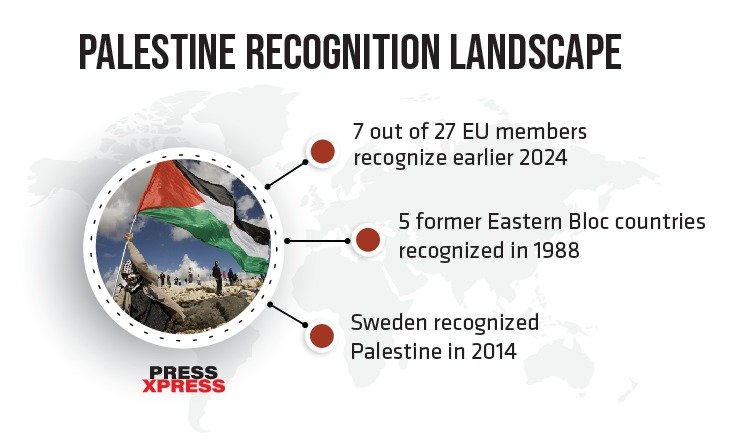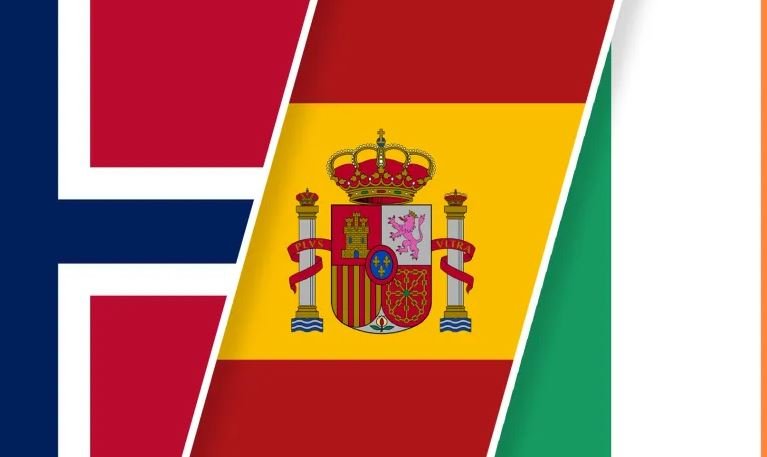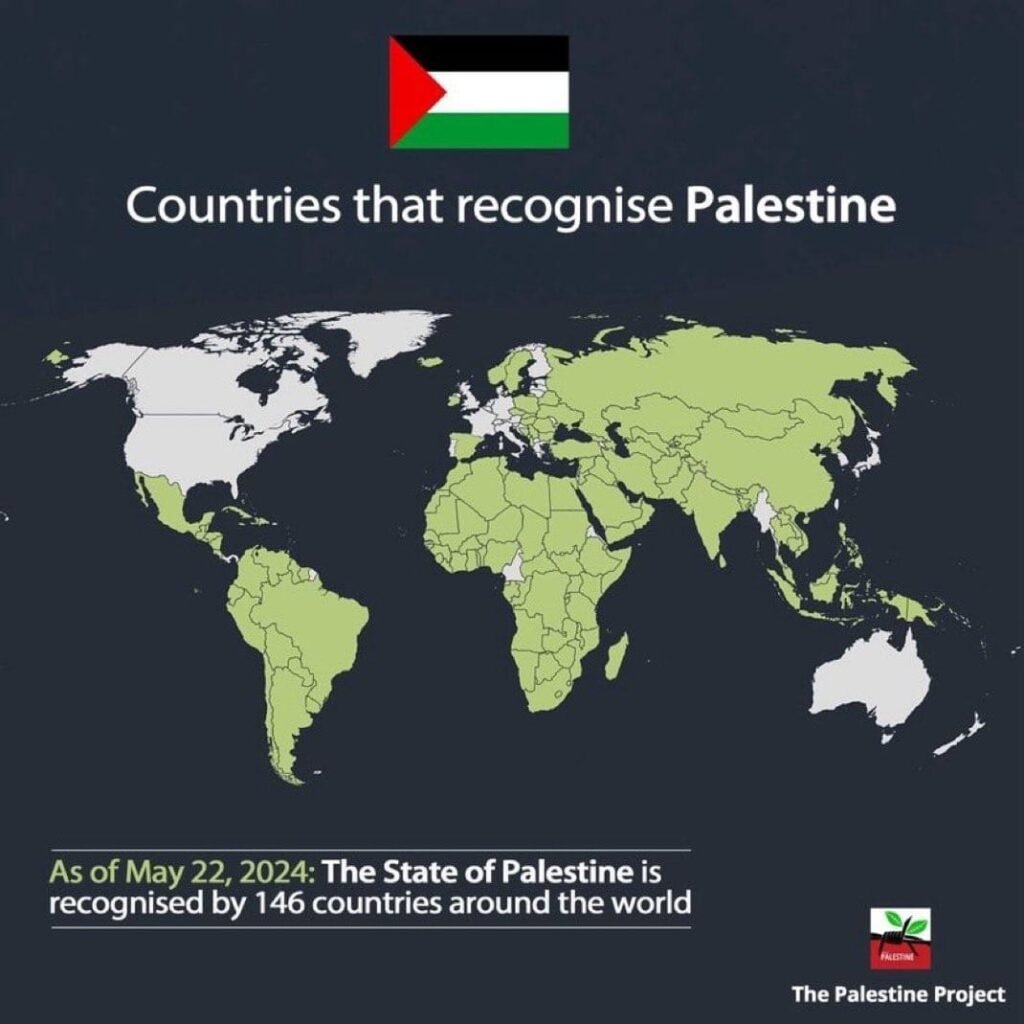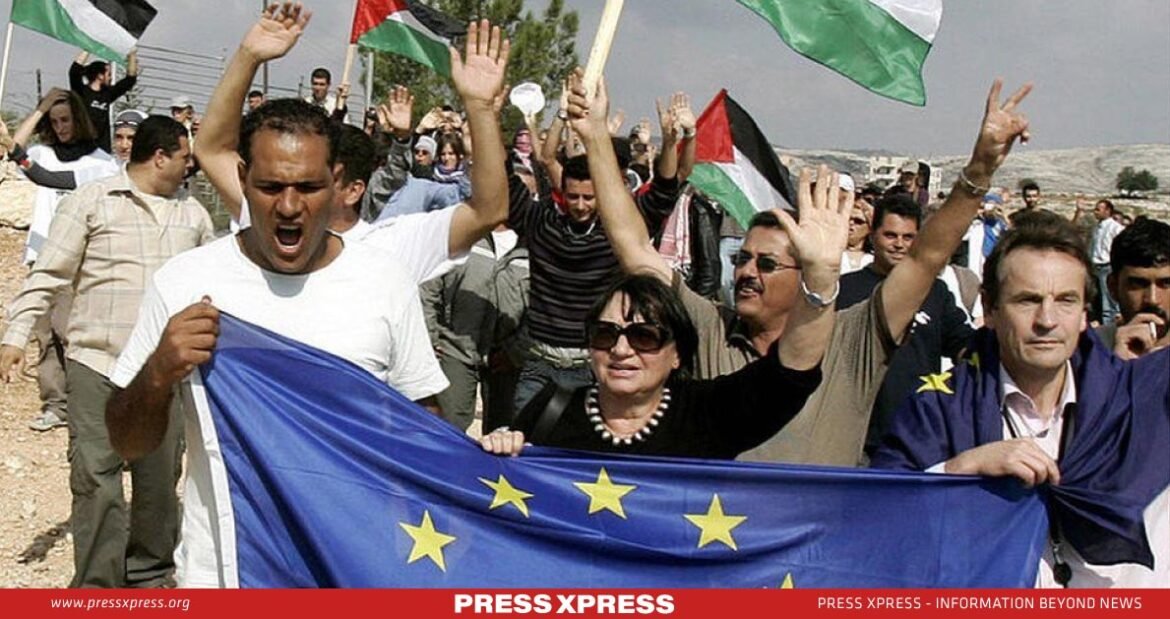- Some 140 of the about 190 countries represented in the UN have already recognized a Palestinian state
- Recognition by Spain, Ireland, and Norway is a significant achievement for Palestinians
- Urgent need for renewed efforts toward a comprehensive resolution
Israel reacted with intense fury after Spain, Ireland, and Norway announced their recognition of a Palestinian state on May 28th. This watershed decision comes amid widespread condemnation of the mounting civilian casualties and humanitarian crisis in Gaza stemming from Israel’s recent military offensive against Hamas. The almost simultaneous decisions by these two European Union countries and Norway could potentially generate momentum for broader recognition of a Palestinian state within the EU and at the United Nations, further isolating Israel.
You Can Also Read: ICC SEEKS ARRESTS, ISRAEL AND US OPPOSE MOVE!
Currently, seven of the 27 European Union member states officially recognize a Palestinian state. Five of these are former Eastern Bloc countries that announced their recognition in 1988, alongside Cyprus, which did so before joining the EU. Sweden recognized Palestine in 2014.

The Czech Republic, an EU member, states that the 1988 recognition by former Czechoslovakia does not apply to its modern state, while Slovakia confirmed its recognition during its transition to independence in 1992-93, maintaining a fully functioning Palestinian embassy in Bratislava since 2006.
Historical Background
A UN partition plan in 1947 called for the creation of both a Jewish and a Palestinian state, but Palestinians and the wider Arab world rejected it due to the disproportionate allocation of land, given the Palestinian population’s majority. Subsequent conflicts, including the 1948 Arab-Israeli war and the 1967 war, resulted in Israel expanding its territory and occupying the West Bank, East Jerusalem, and Gaza.

Western countries, including the United States and Britain, support the idea of an independent Palestinian state alongside Israel as a solution to the Middle East conflict. However, they insist that Palestinian statehood should come through negotiated settlements. No substantive negotiations have taken place since 2009.
The recent EU recognitions, though largely symbolic, enhance the Palestinians’ international standing and increase pressure on Israel to engage in peace talks. The move also brings the Middle East issue into greater prominence ahead of the European Parliament elections from June 6-9.
Why Now?
Diplomatic pressure on Israel has intensified as the conflict with Hamas extends into its 8th month. On May 11, the UN General Assembly voted significantly in favor of granting new ‘rights and privileges’ to Palestine, reflecting growing international support for its full voting membership. Currently, the Palestinian Authority holds observer status.
In March, the leaders of Spain, Ireland, Malta, and Slovenia indicated they were considering recognizing a Palestinian state as ‘a positive contribution’ towards ending the conflict.
Spanish Prime Minister Pedro Sánchez stated on May 23, “This recognition is not against anyone, it is not against the Israeli people. It is an act in favor of peace, justice, and moral consistency.”
Norwegian Foreign Minister Espen Barth Eide, speaking to The Associated Press, emphasized that recognition is “a card that you can play once.” He explained, “We used to think that recognition would come at the end of a process. Now we have realized that recognition should come as an impetus, as a strengthening of a process.”
Implications of Recognition
While dozens of countries have recognized a Palestinian state, none of the major Western powers have done so. It remains unclear how much impact the decisions by Spain, Ireland, and Norway will have. Nevertheless, their recognition is a significant achievement for the Palestinians, who view it as international validation of their struggle. Norway has announced it will upgrade its Palestinian representative office to an embassy, though the specific actions of Ireland and Spain are yet to be detailed.

On the ground, little is likely to change in the short term. Peace talks are stalled, and Israel’s hardline government remains opposed to Palestinian statehood.
Israel’s Response
Israel swiftly condemned the recognitions, with Prime Minister Benjamin Netanyahu stating that these decisions reward terrorism. Netanyahu referred to the Hamas-led attack on October 7, which resulted in significant Israeli casualties and abductions, arguing that a Palestinian state would be a ‘terrorist state’. Israel insists that all issues should be resolved through negotiations and not through unilateral recognitions.
Israel’s response included recalling its ambassadors from Ireland, Norway, and Spain. Historically, Israel has reacted to unfavorable international decisions by summoning ambassadors and imposing measures like freezing tax transfers to the Palestinian Authority.

Who Recognizes a Palestinian State?
Some 140 countries, representing more than two-thirds of the United Nations’ membership, recognize a Palestinian state. Major Western powers have not joined this recognition, often citing the necessity of a negotiated peace. For example, British Foreign Secretary David Cameron has stated that recognition should not occur while Hamas controls Gaza, though it could be considered during negotiations. France and Germany have also expressed reservations, emphasizing the importance of a negotiated two-state solution.
Conclusion
The decisions by Spain, Ireland, and Norway to recognize a Palestinian state reflect increasing international frustration with the stagnant peace process and the humanitarian crisis in Gaza. These recognitions, while symbolic, bolster Palestinian aspirations and international legitimacy, but also escalate diplomatic tensions with Israel. The situation underscores the urgent need for renewed efforts toward a comprehensive and lasting resolution to the Israeli-Palestinian conflict.


